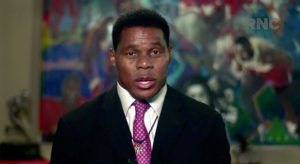The actor and inveterate gambler Omar Sharif threw away his career for the pleasures of the casino. Asked how he felt after a particularly disastrous binge in which he lost almost everything to his name, the star of Dr Zhivago is said to have replied, “Clean.”
I thought of Sharif while in Georgia this weekend, trying to get to grips with the Senate race between incumbent Democrat Raphael Warnock and Republican challenger Herschel Walker. People outside the state seem incredulous that anyone in their right mind could vote for Walker, a former football star whose personal history is littered with the sorts of scandals that, while not so shocking for ex-NFL players, would normally sink a Senate candidate — abortions for multiple mistresses, a parade of illegitimate and unacknowledged children, gruesome domestic violence allegations, and claims that he once threatened a shootout with Texas police. According to a Quinnipiac poll from mid-October, a majority of Georgians agree that Walker is “not honest” and “does not have good leadership skills”.
And yet, polls in the state remain deadlocked, with the latest average from RealClearPolitics showing Walker leading Warnock by a margin of 1.5%. Everyone, it seems, agrees that Walker is a flawed candidate and a flawed human being, and that Warnock, a well-spoken preacher with a penchant for funny campaign ads, is charming and relatable. The result is that this is a remarkably “clean” campaign, at least from the Republican side — there is little effort to convince people that he is “suitable” for office. Voters know that Walker is a bit of a joke. But the GOP is asking them to ignore Walker’s personal characteristics and focus on the pure, friend-enemy core of partisan politics: do you want the Senate to be controlled by Republicans or Democrats? On the strength of this issue alone, Walker might win.
That’s because Georgia, despite having two Democratic senators, is still a Republican state. For at least a decade, Democrats have been hoping that migration into the Atlanta metro area, which has nearly doubled in size since 2000 and now accounts for more than half of the state’s population, would turn Georgia purple if not blue. That has been happening — the white share of Georgia’s electorate dropped from 68.7% in 2004 to 52.7% today — but not quickly enough. Donald Trump won the state handily in 2016, and it took the chaos of 2020 — the coronavirus pandemic, the “racial reckoning”, Trump’s alienation of affluent white suburbanites, and especially his instigation of an intra-Republican civil war in Georgia between the November 3 election and the January 2021 Senate runoff, which induced his supporters to stay home — for Democrats to eke out two Senate victories by margins of 1% and 1.8%. Before Walker won the Republican Senate primary, Warnock’s seat was expected to be one of the easiest for the GOP to recapture in the midterms.
Added to which, our national electoral environment massively favours Republicans. As a general rule, the president’s party does poorly in midterm elections, even under relatively popular presidents. Biden is not popular, and the issues the election is being fought on all benefit the GOP. Inflation hit double digits in Atlanta this year, higher than the national average, and the city had more homicides in 2021 than in any year since 1996 and could end 2022 with even more. Asked about the most important issues facing the country, 36% of Georgians said cost of living or the economy, 14% said immigration, and 6.8% said crime. By contrast, the top “Democratic” issues were “threats to democracy” at 17%, guns at 10%, and abortion — widely expected to doom Republicans among college-educated women — at 5.2%.
It is a testament to Walker’s weaknesses as a candidate, and to Warnock’s relative strengths, that the race is close at all. I was in Athens, Georgia, on Saturday for the Georgia–Tennessee football game — the place Walker became a star, and where his name and college number hang on the inside of the stadium — and even there, signs of Walker the politician, as opposed to the player, were few and far between. I counted, easily, three dozen people wearing pins and stickers for Brian Kemp, the incumbent Republican governor, but most laughed or declined to speak to me when I asked about Walker. “He’s a Republican,” shrugged one woman in a Kemp pin who declined to give her name. I finally found a group of young white men wearing Walker pins, but when I asked for their thoughts on the race, they told me, in a vaguely aggressive manner, that voting was a private matter and that I shouldn’t be walking around asking those sorts of questions.
Walker’s critics, on the other hand, were happy to talk. A black man in his early 30s named Rashad, who said he’d already cast an early ballot for Warnock, told me bluntly that he suspected Walker had brain damage from CTE, or chronic traumatic encephalopathy, a degenerative brain disease that’s known to affect football players. Keith, a middle-aged white man working in corporate communications in Atlanta, told me that Walker could hardly string a sentence together and was clearly being used as a puppet. “You’re not even voting for him, you’re voting for whoever is controlling him. The whole thing is an embarrassment to the state of Georgia.”
For Georgia Democrats, the race largely comes down to voters like Keith — suburban moderates whose distaste for Trump and the Trumpian elements of the GOP helped deliver surprise victories to Warnock and Jon Ossof in 2020. There is constant talk of “ticket-splitting” — the hope is that enough independents and Republican-leaners will vote for Brian Kemp for governor but choose Warnock for Senate, or else vote third-party. In my parents’ own leafy Atlanta suburb, a Republican stronghold that flipped to the Democrats in 2018, and where the average home price exceeds $660,000, I counted perhaps a dozen houses with Warnock yard signs. There were a few for Kemp, but only one that I saw for Walker. Warnock radio ads urged listeners to vote for the candidate with “good moral character”, even if they didn’t agree with him on every issue — a concession to the fact that many of these voters would probably prefer a Republican senator in policy terms.
But it seems increasingly likely that distaste for Biden and frustration with the state of the economy will be too much for Warnock to overcome. Over the summer, Democrats and many in the media entertained the idea that some combination of the Dobbs abortion decision, the January 6 hearings, and a brief bump in Biden’s approval ratings might save the Democrats from a wipeout. But in recent weeks, the mood — and the polls — have shifted hard toward the GOP. Once-tight races have turned into apparent Republican blowouts, and once-lopsided Democratic leads have become tight races. A story broke late Friday about how Democrats in New York are bracing for a potential loss in the governor’s race — a race that Andrew Cuomo won by more than 23% in 2018. In Georgia’s governor’s race, Kemp, a fairly generic Republican without any of Walker’s personal problems, went into election weekend leading Democratic media darling Stacey Abrams by 7.6%.
The major problem is that for all of Walker’s flaws, voters are angry at the Democrats for a whole host of reasons, and none of the Democrats’ messaging — which has largely focused on abortion and the dangerous extremism of the Republicans — is responsive to this anger. The chances are that Walker will win, and if he does, it will be because of people like the young, suburban Atlantan I spoke to who said, frankly: “Walker probably has an IQ of about 60. But at least he’s not a Democrat.”
Disclaimer
Some of the posts we share are controversial and we do not necessarily agree with them in the whole extend. Sometimes we agree with the content or part of it but we do not agree with the narration or language. Nevertheless we find them somehow interesting, valuable and/or informative or we share them, because we strongly believe in freedom of speech, free press and journalism. We strongly encourage you to have a critical approach to all the content, do your own research and analysis to build your own opinion.
We would be glad to have your feedback.
Source: UnHerd Read the original article here: https://unherd.com/




